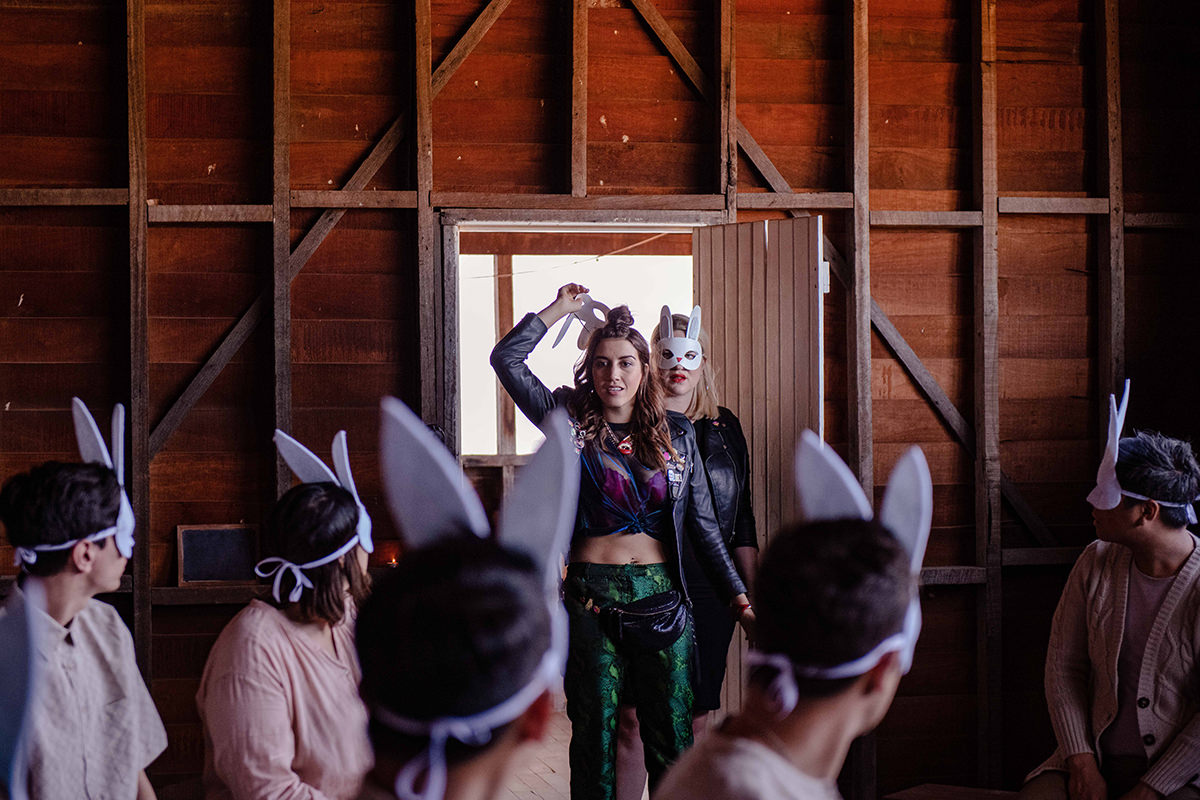
Claudia O’Doherty to star in Sarah’s Channel / Photo by Ramona Rosales © augustimage.com (USA) ravenandsnow.com (AUS)
Four comedies and one drama form the latest Online Production slate from Screen Australia. Four of the creative teams are receiving Screen Australia funding for the first time, including producers Karen Colston and Robbie Miles who will create the six-part parody Sarah’s Channel for ABC iview. Claudia O’Doherty (Amy Schumer’s Trainwreck, Netflix’s Love) will star in the title role.
Sarah’s Channel follows beauty vlogger Sarah who discovers she’s been reanimated after an apocalypse. Live performer and theatre playwright Nick Coyle will make the jump to screen to write/direct, fresh off the back of his hit play The Feather in the Web.
“I’m thrilled (and surprised) that my idea of a Beauty Vlogger uploading videos in a post-apocalyptic world has been green-lit, and excited to be collaborating with such a fantastic team to bring it to life,” said Coyle. “There is so much comedy to mine in the online influencer world, and so many pre-existing fans who I hope will love this new take on the genre.”
Producer Karen Colston of Yellow Creative Management added, “We’re so pleased Nick’s unique voice will be seen by a wider audience than those lucky enough to have caught his brilliant theatre work, and we hope to create a pathway to screen for other stage practitioners. The concept and execution of Sarah’s Channel is inextricably linked to the internet, so it is uniquely suited to the online series format.”
Emmy-award winning Queensland studio Ludo are also creating a series for the ABC, satirising the web life-coach industry in the six-part comedy Content. Completion funding has been provided to the emerging creators behind comedies How To Know If You’re Dating A Narcissist and Single Ladies, plus family drama Time & Place.
“We have a healthy appetite for creative risk in Online Production, and want to support new creators who are trying out bold concepts,” said Screen Australia Investment Manager Lee Naimo. “I’m particularly pleased to see the majority of projects in this slate have female central characters, and female directors.”
“As we’ve seen most recently with Superwog and Sheilas, online content can well and truly compete with traditional mediums in terms of production values and audience share. Now is the time for emerging creators to be taking advantage of Screen Australia’s revised Development funding opportunities to refine their concepts, and get in touch with us in Online Production to discuss their projects.”
Please find funded project blocklines below.
ONLINE FUNDING
Since 2008, Screen Australia has funded more than 200 online projects, collectively amassing over 290 million views on YouTube alone.
In 2017/18, Screen Australia provided $3.479m in production funding to online dramas. Recipients included Theo and Nathan Saidden for the Superwog series, which launched in October 2018. The first three episodes of the comedy all trended #1 on YouTube, and have already amassed over ten million views.
The agency also provided near $600k in online talent and sector development in 2017/18, including the hugely popular Google Skip Ahead and ABC Fresh Blood initiatives.
Screen Australia invests in online documentaries and online works from Indigenous creators through additional funding programs.
Four of the five titles nominated for the 2018 AACTA for ‘Best Online Video or Series’ were Screen Australia funded.
ONLINE CONTENT
Screen Australia’s Drama Report detailed that the budgets and expenditure for Australian online dramas* more than tripled in 2017/18 to $53 million. There were seven fewer online drama titles compared to 2016/17, however the higher volume of hours and significant increase in budgets stemmed from the production of content with longer episodes and higher cost per hour.
18 Australian titles* were made for first release online in 2017/18, including ABC iview’s Deadlock and SBS On Demand’s Homecoming Queens – both of which are nominated for Best Online Video or Series in the 2018 AACTA Awards.
*includes single episodes or series titles with total durations of 30 minutes or more.
 How To Know If You’re Dating A Narcissist
How To Know If You’re Dating A Narcissist
CONTENT
1 x 60 min / 6 x 10 min
Ludo Studio (QLD)
Genre: Comedy
Producer: Meg O’Connell
Executive Producers: Charlie Aspinwall, Daley Pearson
Director: Daley Pearson
Writer: Anna Barnes
Platform: ABC TV and ABC iview
Synopsis: Lucy is a woke, successful influencer who wants to help you achieve everything you’ve wanted – a partner, a career and contentedness. Unfortunately, Lucy has a severely unhealthy relationship with her phone which keeps her from achieving any of these things herself.
Production credit: Content is a Ludo Studio production for the ABC. Principal production investment from Screen Australia, in association with Screen Queensland.
HOW TO KNOW IF YOU’RE DATING A NARCISSIST
6 x 5mins
Sweary Canary Films (NSW)
Genre: Comedy
Producers: Kristy Best, Michelle Lia (Associate), Enzo Tedeschi
Directors: Kristy Best
Writers: Kristy Best
Platform: TBC
Synopsis: Follow multi-narcissist survivor Kristy Best as she abrasively whisks you through a surreal lifestyle parody hell-bent on teaching women everywhere How To Know If You’re Dating A Narcissist.
Production credit: How to Know If You’re Dating a Narcissist is a Sweary Canary Films productions. Production investment from Sweary Canary Films in association with Screen Australia.
SARAH’S CHANNEL
6 x 5 mins
Yellow Creative Management Pty Ltd and Mythmaker Media Pty Ltd (NSW)
Genre: Comedy
Producers: Karen Colston, Robbie Miles
Executive Producers: Mark Morrissey, Jean Mostyn, Claudia O’Doherty
Director: Nick Coyle
Writer: Nick Coyle
Platform: ABC iview
Synopsis Sarah’s Channel is a quirky, relatable Youtube channel created and run by Sarah, who isn’t going to let the fact that she’s been re-animated in a post-apocalyptic future stop her from doing what she’s famous for: Beauty Vlogging. Sure, everyone she knew is dead, the subterranean mutants who worship her are annoying, and a monster is trying to kill her, but Sarah’s got some fantastic makeup tips and it’ll take more than that to prevent her from uploading them.
Production credit: Sarah’s Channel is a Yellow Creative and Mythmaker production for the ABC. Principal production investment from Screen Australia, in association with Create NSW.
SINGLE LADIES
6 x 8 mins
Story Republic Pty Ltd (WA)
Genre: Comedy
Producer: Joshua Gilbert
Executive Producer: Ros Walker
Directors: Gemma Hall, Mimi Helm, Jacqueline Pelczar
Writer: Aaron Moss
Platform: TBC
Synopsis: Single Ladies follows the misadventures of unlikely trio Catherine, Nina and Hashim as they try to save their sex positive radio show from the conservative owners of the station.
Production credit: Single Ladies is a Story Republic production. Production investment from Screen Australia and Screenwest.
TIME & PLACE
7 x 9 mins
Gemini Arts and Media Pty Ltd (QLD)
Genre: Drama
Producer: Tam Sainsbury, Dylan Schenkeveld
Director: Tam Sainsbury
Writer: Tam Sainsbury
Platform: TBC
Synopsis: After living abroad for years, magazine writer Rebecca Woodruff returns for a holiday to her hometown of Golden Beach with her husband and daughter. Her family; divorced mum and dad, her mum’s new lesbian partner, her married sister and wildly single lawyer brother; are all thrilled to have her home. As Rebecca navigates her family’s chaos, her marriage begins to crumble and her deeply hidden secret begins to surface and she realises that maybe this is the time and the place where she now needs to be…..permanently.
Production Credit: Time & Place is a Gemini Arts and Media production. Principal production investment from Screen Australia, in association with Sunshine Coast Council and Arts Queensland.
 Single Ladies
Single Ladies
